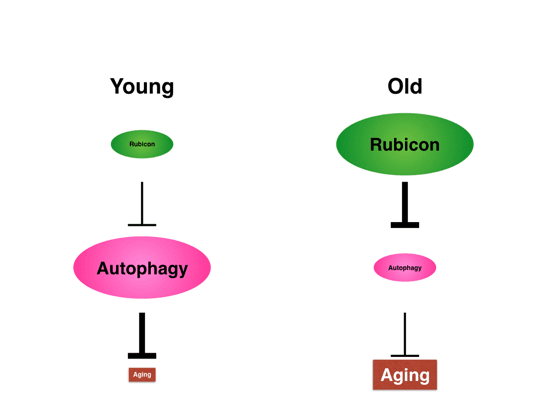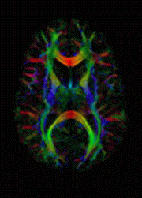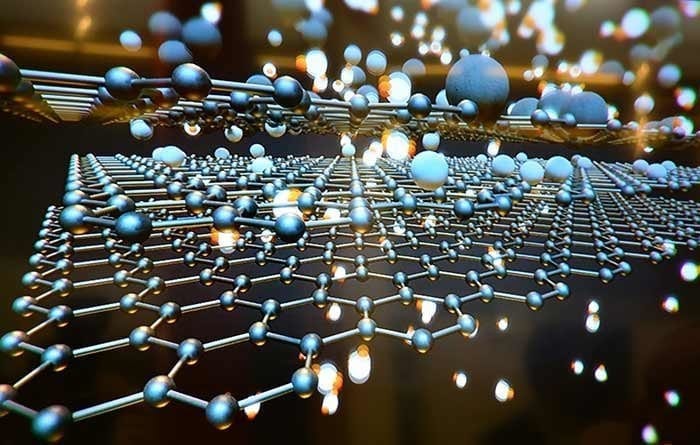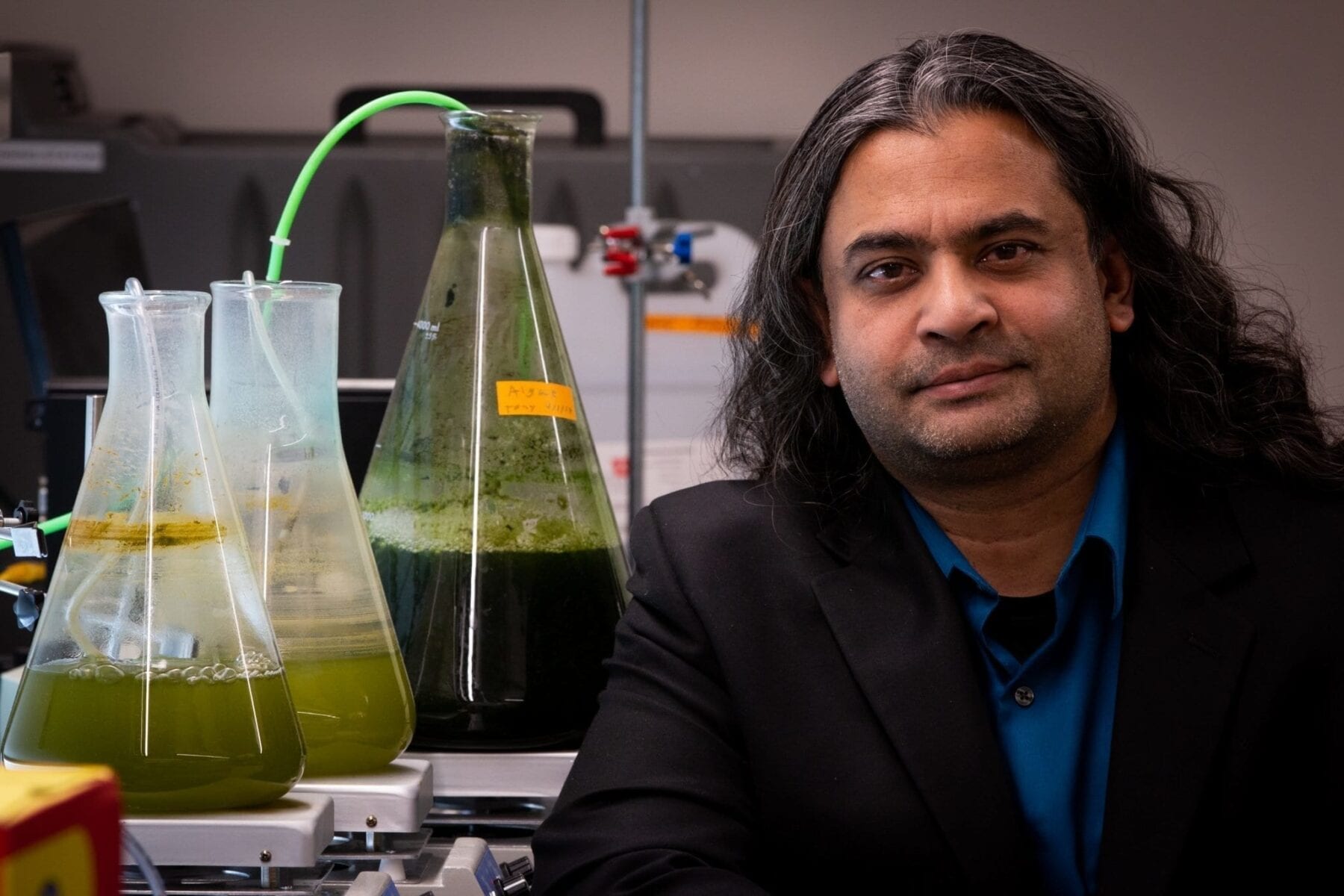
Age-dependent increase in expression of Rubicon, a negative regulator of autophagy, is a cause of age-dependent autophagic impairment and contributes to acceleration of aging in animals.
(credit: Osaka University)
Autophagy is an important biological recycling mechanism that is used to maintain homeostasis (balance or equilibrium) within all types of animal tissue. Many studies have attempted to understand the relationship between the reduction of autophagy and progression of aging in animals; however, none have provided a clear explanation, until now.
In 2009, a research team led by Tamotsu Yoshimori at Osaka University identified Rubicon as a protein factor that suppresses autophagy by controlling a specific step in this pathway. This time, the team found that Rubicon expression levels increased in an age-related manner in worm, fly, and mouse tissues, publishing their findings in Nature Communications.
Autophagy allows degradation of damaged cellular components and helps to avoid the onset of a variety of diseases related to cellular stress and dysfunction, including cancer, neurodegenerative diseases, and metabolic syndromes. Reduced autophagy has recently been linked to progression of aging in animals. While a variety of methods can increase autophagy in aged animals, thereby slowing the aging process, there has been no definite finding regarding the underlying cause of naturally reduced autophagy.
“Rubicon has been linked to inhibition of the autophagic process, and knockout of Rubicon in mice helped to mitigate autophagy-related liver diseases,” says Yoshimori. “Therefore, we suspected that Rubicon may directly affect aging through its interaction with autophagy.”
In the study, increased levels of Rubicon were found in tissues from multiple aged model organisms (worms, flies, and mice). When the researchers suppressed Rubicon expression, all model organisms demonstrated increased autophagy activity, which led to improvement of multiple age-related factors and slightly increased lifespan in worms and flies.
“Our analyses revealed that Rubicon suppression in model organisms led to reduction of age-associated motor decline, as well as reduction of fibrosis,” says Shuhei Nakamura, lead author on the study. “Importantly, we found that Rubicon suppression enabled aged mice to resist attempts to induce Parkinson’s disease.”
The findings in this study suggest that, because elevated levels of Rubicon lead to reduced autophagy in aged animals, suppression of Rubicon may be critical in extending healthy lifespan in humans.
Learn more: The key to increased lifespan? Rubicon alters autophagy in animals during aging
The Latest on: Aging
[google_news title=”” keyword=”aging” num_posts=”10″ blurb_length=”0″ show_thumb=”left”]
via Google News
The Latest on: Aging
- Agency on Aging seeks applicants for grant-funded serviceson April 27, 2024 at 8:00 am
Western Illinois Area Agency on Aging (WIAAA) will release a competitive request for proposal on May 6 for Title III grant-funded services for transportation, nutrition services (congregate and home ...
- Celebrities Quietly Paying Huge Amounts for Anti-Aging Stem Cell Therapy That May Cause Gruesome Side Effectson April 27, 2024 at 6:31 am
Experts caution that there's limited evidence backing the benefits of these stem cell treatments, while pointing to plenty of risks.
- Explosive growth, tourism weigh heavy on Western Montana’s aging roadson April 27, 2024 at 6:06 am
The increased traffic, along with Montana’s harsh weather, puts more wear and tear on roads, Boucher said. Many of the state’s bridges are nearing the end of their design life, contributing to the ...
- Best anti-aging eye creams to help you turn back the clockon April 26, 2024 at 8:57 pm
Our guide to the best anti-aging eye creams will help you to rejuvenate the skin around your eyes and reduce the signs of aging, with clinically proven results.
- Bus riders bemoan aging fleet, suspended routes: What Ithaca's transit agency is doingon April 26, 2024 at 11:11 am
Tompkins County’s Transportation Equity Coalition has released the results of a county-wide Transportation Equity Needs Assessment , which found that self-identified limited, low or no-income county ...
- Curling and the nuances of aging: A study on older Canadian women’s experienceson April 26, 2024 at 11:00 am
Older Canadian women use curling to manage aging, showing that the sport helps them resist physical and cognitive decline, adapt to age-related changes with inclusive modifications, and redefine aging ...
- Does reproduction influence epigenetic aging in younger women?on April 24, 2024 at 5:00 pm
A recent Proceedings of the National Academy of Sciences study investigated the association between reproduction and biological aging based on epigenetic clocks. From the 8th to the 19th century, ...
- Silver hair, silver dollars: Wyoming's aging population means big spending for the stateon April 24, 2024 at 12:21 pm
The graying of America, and Wyomingites, need long-term care in the coming decades. How will the state deal with the cost?
- The dual challenge of the sandwich generation: Raising children while caring for aging parentson April 24, 2024 at 9:42 am
Lisa Ling is a CBS News contributor and part of the sandwich generation herself. Ling's family is part of nearly 80 million Americans taking care of children and our elderly parents at the same time.
- The 11 Best Anti-Aging Serums for Firmer, Brighter Skin, According to Real Womenon April 24, 2024 at 4:15 am
Anti-aging serums can be an aid during this physical change, which starts when collagen production drops in our 20s. Just as daily vitamins bridge nutritional deficiencies, anti-aging serums “deliver ...
via Bing News










